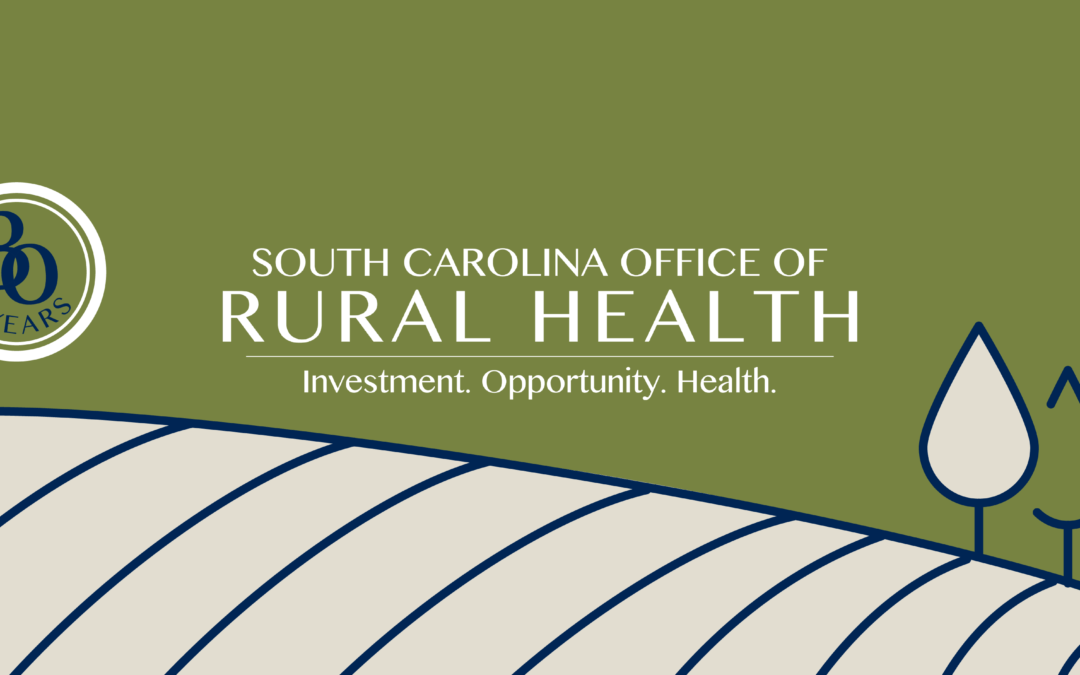The South Carolina Office of Rural Health (SCORH) was created 30 years ago, when federal legislation and funding from the Federal Office of Rural health Policy established an office of rural health in each of the 50 states. In 1991, SCORH began as an office within the SC Department of Health and Environmental Control (DHEC). At that time, our office had just a few staff members.
By 1994, SCORH transferred out of DHEC, and gained nonprofit status the following year. SCORH is one of only three State Offices of Rural Health that operates as a non-profit. The others are part of the state departments of health or housed within public universities.
“Like all State Offices of Rural Health, our mission is to collect and disseminate information, provide technical assistance, and to support the work of rural healthcare providers,” said SCORH’s Chief Executive Officer, Graham Adams, Ph.D. “As a nonprofit, we have the unique opportunity and autonomy to pursue innovative projects and seek new ways of supporting our rural communities.”
In the decade after becoming an independent nonprofit, our office grew tremendously, both in our physical presence and in our program offerings, thanks to some critical grant funding. We secured funding from the federal Healthy Start program to serve pregnant women and infants. We received a 10-year grant from the Robert Wood Johnson Foundation to increase access to healthcare in the rural south. And we received funding from the Medicare Rural Hospital Flexibility (FLEX) program to support rural hospitals.
In 1997, we launched our Rural Health Revolving Loan Fund, which to date has successfully leveraged nearly $137 million in coordination with local lenders, saving or creating over 855 jobs in rural South Carolina.
We also began our network development efforts in 1998 to bring together health care providers, local health departments and social service providers, as well as partners such as local school districts, community colleges, non-profits and local government. Together, these networks leverage their resources and align their services to deliver the right type of care at the right time to as many patients as possible.
We opened a second office in Denmark in 1998, and built a new headquarters for SCORH in Lexington in 2005. At that time, we also began supporting the Rural Health Clinics (RHCs) across South Carolina. RHCs are federally designated facilities that provide primary care and preventive health services in rural, medically under-served areas. RHCs have a separate reimbursement structure from the standard medical office under the Medicare and Medicaid programs.
In 2008, we founded The Benefit Bank of South Carolina to help residents access federal resources for food, health care and other basic needs. By 2014, that program was established as an independent non-profit, SC Thrive, which continues its mission today of helping people access the resources they need.
In 2014, SCORH received funding from the SC Department of Health and Human Services (DHHS) to help rural practices develop the medical home model of care, and obtain Patient-Centered Medical Home (PCMH) recognition. At the time, BlueCross BlueShield of South Carolina had a similar team that supported medical home recognition for practices that served a large number of BCBS members. To align efforts, we created the SC Patient Centered Primary Care Alliance. This Alliance grew to include the SC Hospital Association, SC Medical Association, DHHS, and DHEC. SCORH provided training, workshops, webinars, and intensive in-practice facilitation. The demand was significant, so we expanded the team into what we now call the Center for Practice Transformation. We continue to have a contract with DHHS to provide this support to practices and have assisted some 100 practices in gaining PCMH recognition.
While continuing to fight for equal access and better health care for rural residents, the scope of our mission has expanded to include social determinants of health – those factors such as housing, employment, behavioral health and food access that influence the overall health of a community. Our office in Denmark became the home of our Healthy Start and Nurse-Family Partnership programs – collectively called Family Solutions of the Low Country – to serve pregnant women, infants and young families.
Family Solutions of the Low Country moved to Orangeburg in 2010, and then to a permanent office in Orangeburg in 2019, when the program was rebranded as simply Family Solutions. Today, the SC Office of Rural Health has more than 40 staff members between the two offices.
SCORH also implemented a coalition-based approach to building local capacity and addressing challenges facing individual communities by launching the Blueprint for Health program in 2015 and Healthy People, Healthy Carolinas in 2017 in partnership with the SC Hospital Association.
In 2017, SCORH led the development of the SC Rural Health Action Plan, a broad roadmap for improving the health status of our rural communities. This effort included input from community leaders across multiple sectors and resulted in 15 recommendations and 50+ action steps to guide collaborations between the health, housing, educational and employment sectors.
As we celebrate our 30th anniversary, we are putting the Rural Health Action Plan into motion through our Rural Forward SC initiative, which threads together our programs and expertise with the work being done by community partners to better reach more residents in need.
“There are multiple factors that contribute to overall health of a community and the people who live there – the places we live, where we work, our opportunities for recreation,” Adams said. “We are optimistic that our work in the future will continue to break down the silos between these sectors so that we can create a common vision for promising, sustainable, healthier rural communities.”

